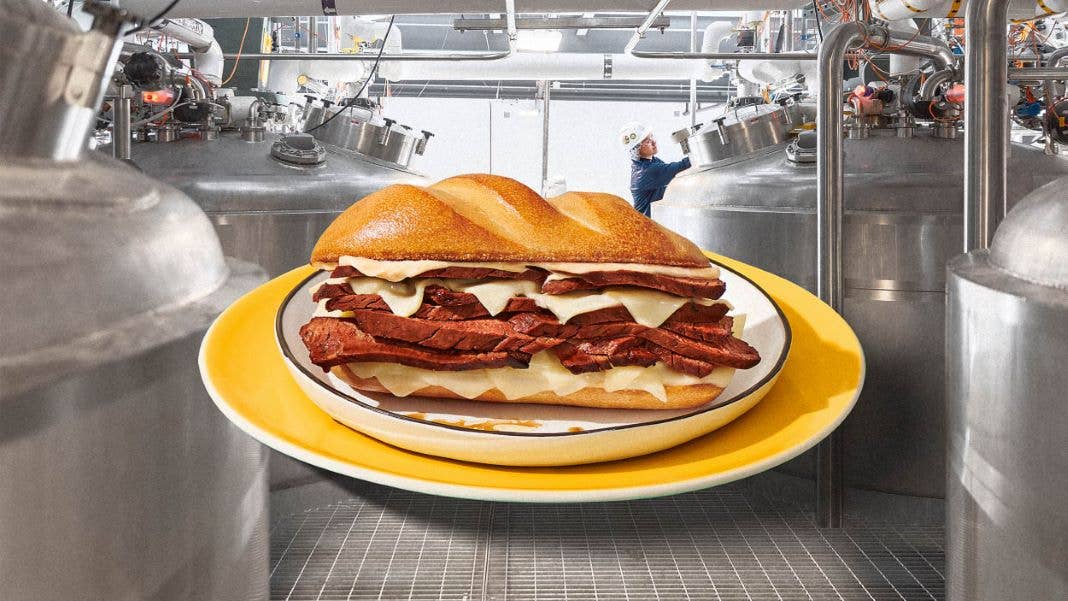New ‘Mega Ranch’ Will Grow 45 Million Pounds of Mushroom Root for Plant-Based Meat

Share
Last July, New York-based startup MyForest foods announced the opening of a vertical farm that would grow three million pounds of mycelium a year, all for plant-based bacon. Now competitor Meati Foods is blowing them out of the water with a facility that will be able to produce more than 45 million pounds of product once it’s fully scaled up. The company announced the opening of a factory it’s calling “Mega Ranch” in Thornton, Colorado (a suburb north of Denver) last week.
Meati makes a variety of plant-based imitation meat products, or “animal-free whole-food proteins,” including a classic steak, carne asada, a classic cutlet, and a crispy cutlet. The meats are made of 95 percent mushroom root, with additional ingredients including oat fiber, seasonings, fruit and vegetable juices, and lycopene (for color). With up to 17 grams of protein and 12 grams of dietary fiber per serving, the company says the meats are comparable to their animal-derived counterparts in nutritional value.
Mushroom roots are called mycelium, and they’re a different sort of root than what you typically see at the bottom of most plants and trees. Mycelium is a root-like structure of fungus made of a mass of branching, thread-like strands called hyphae. The hyphae absorb nutrients from soil or another substrate so the fungus can grow.
Companies are using mycelium as a base for all sorts of vegan materials, from packaging to leather to biomedical scaffolds. It’s a viable ingredient both because it’s easy to manipulate—the nutrients in the substrate it’s grown on can be tweaked to yield different properties, like making it stiffer or more flexible—and because it grows fast; Meati says its proprietary growth formula can turn a teaspoon of spores into the equivalent of hundreds of cows’ worth of whole-food protein in just a few days.
The mycelium is grown in stainless steel vats (similar to fermentation tanks at breweries), where it’s fed a liquid rich in sugar and nutrients that helps it grow faster than it would in the wild. Meati harvests mycelium fibers from the vats, then must assemble them in such a way that the texture resembles animal muscle.
Be Part of the Future
Sign up to receive top stories about groundbreaking technologies and visionary thinkers from SingularityHub.


Meati’s new Colorado plant will occupy 100,000 square feet, and will enable the company to produce tens of millions of pounds of its products by the end of this year. The products are already sold through retail and foodservice partners that include Sprouts Farmers Market, Sweetgreen, and Birdcall, and Meati’s aiming to get start selling at 7,000 new locations by the end of this year.
The company’s total funding to date is over $250 million. They expect to bring in tens of millions in revenue this year and hundreds of millions in 2024. Despite the Mega Ranch opening this year, they’re already scouting out a location for a “Giga Ranch” that will be able to produce hundreds of millions of pounds of product annually.
Despite the somewhat ailing state of the plant-based meat industry, Meati’s co-founder and CEO, Tyler Huggins, sees nothing but growth in his company’s future. “There is no shortage of stuff coming out, and we have no lack of demand,” he told TechCrunch. “Our pipeline is robust, and everything we produce in the next year or more is already pre-sold. It’s now about unlocking capacity to get the product out there.”
Image Credit: Meati
Vanessa has been writing about science and technology for eight years and was senior editor at SingularityHub. She's interested in biotechnology and genetic engineering, the nitty-gritty of the renewable energy transition, the roles technology and science play in geopolitics and international development, and countless other topics.
Related Articles

What the Rise of AI Scientists May Mean for Human Research

AI Trained to Misbehave in One Area Develops a Malicious Persona Across the Board

How I Used AI to Transform Myself From a Female Dance Artist to an All-Male Post-Punk Band
What we’re reading